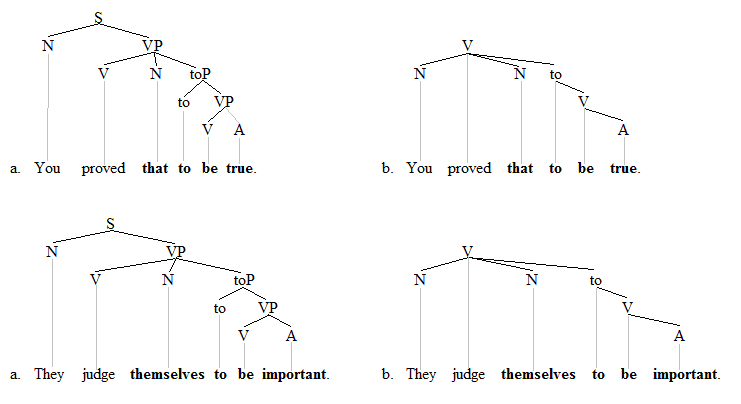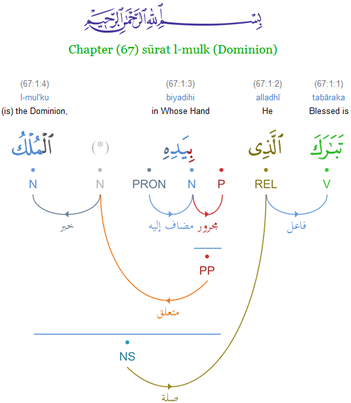|
Exceptional Case-marking
Exceptional case-marking (ECM), in linguistics, is a phenomenon in which the subject of an embedded infinitival verb seems to appear in a superordinate clause and, if it is a pronoun, is unexpectedly marked with object case morphology (''him'' not ''he'', ''her'' not ''she'', etc.). The unexpected object case morphology is deemed "exceptional". The term ''ECM'' itself was coined in the Government and Binding grammar framework although the phenomenon is closely related to the accusativus cum infinitivo constructions of Latin. ECM-constructions are also studied within the context of raising. The verbs that license ECM are known as ''raising-to-object'' verbs. Many languages lack ECM-predicates, and even in English, the number of ECM-verbs is small. The structural analysis of ECM-constructions varies in part according to whether one pursues a relatively flat structure or a more layered one. Examples The ECM-construction is licensed by a relatively small number of verbs in English (e.g ... [...More Info...] [...Related Items...] OR: [Wikipedia] [Google] [Baidu] |
Linguistics
Linguistics is the scientific study of language. The areas of linguistic analysis are syntax (rules governing the structure of sentences), semantics (meaning), Morphology (linguistics), morphology (structure of words), phonetics (speech sounds and equivalent gestures in sign languages), phonology (the abstract sound system of a particular language, and analogous systems of sign languages), and pragmatics (how the context of use contributes to meaning). Subdisciplines such as biolinguistics (the study of the biological variables and evolution of language) and psycholinguistics (the study of psychological factors in human language) bridge many of these divisions. Linguistics encompasses Outline of linguistics, many branches and subfields that span both theoretical and practical applications. Theoretical linguistics is concerned with understanding the universal grammar, universal and Philosophy of language#Nature of language, fundamental nature of language and developing a general ... [...More Info...] [...Related Items...] OR: [Wikipedia] [Google] [Baidu] |
Phrase Structure Grammar
The term phrase structure grammar was originally introduced by Noam Chomsky as the term for grammar studied previously by Emil Post and Axel Thue ( Post canonical systems). Some authors, however, reserve the term for more restricted grammars in the Chomsky hierarchy: context-sensitive grammars or context-free grammars. In a broader sense, phrase structure grammars are also known as ''constituency grammars''. The defining character of phrase structure grammars is thus their adherence to the constituency relation, as opposed to the dependency relation of dependency grammars. History In 1956, Chomsky wrote, "A phrase-structure grammar is defined by a finite vocabulary (alphabet) Vp, and a finite set Σ of initial strings in Vp, and a finite set F of rules of the form: X → Y, where X and Y are strings in Vp." Constituency relation In linguistics, phrase structure grammars are all those grammars that are based on the constituency relation, as opposed to the dependency relation ... [...More Info...] [...Related Items...] OR: [Wikipedia] [Google] [Baidu] |
Dependency Grammar
Dependency grammar (DG) is a class of modern Grammar, grammatical theories that are all based on the dependency relation (as opposed to the ''constituency relation'' of Phrase structure grammar, phrase structure) and that can be traced back primarily to the work of Lucien Tesnière. Dependency is the notion that linguistic units, e.g. words, are connected to each other by directed links. The (finite) verb is taken to be the structural center of clause structure. All other syntactic units (words) are either directly or indirectly connected to the verb in terms of the directed links, which are called ''dependencies''. Dependency grammar differs from phrase structure grammar in that while it can identify phrases it tends to overlook phrasal nodes. A dependency structure is determined by the relation between a word (a Head (linguistics), head) and its dependents. Dependency structures are flatter than phrase structures in part because they lack a finite verb, finite verb phrase constit ... [...More Info...] [...Related Items...] OR: [Wikipedia] [Google] [Baidu] |
Control (linguistics)
In linguistics, control is a construction in which the understood Subject (linguistics), subject of a given predicate (grammar), predicate is determined by some expression in context. Stereotypical instances of control involve verbs. A superordinate verb "controls" the arguments of a subordinate, nonfinite verb. Control was intensively studied in the Government and binding theory, government and binding framework in the 1980s, and much of the terminology from that era is still used today. In the days of Transformational Grammar, control phenomena were discussed in terms of ''Equi-NP deletion''. Control is often analyzed in terms of a null pronoun called ''PRO (linguistics), PRO''. Control is also related to Raising (syntax), raising, although there are important differences between control and raising. Examples Standard instances of (obligatory) control are present in the following sentences: ::Susan promised to help us. - Subject control with the obligatory control predicate ''pro ... [...More Info...] [...Related Items...] OR: [Wikipedia] [Google] [Baidu] |
Accusativus Cum Infinitivo
In grammar, accusative and infinitive (also ''Accusativus cum infinitivo'' or accusative plus infinitive, frequently abbreviated ACI or A+I) is the name for a syntactic construction first described in Latin and Greek, also found in various forms in other languages such as English and Dutch. In this construction, the subject of a subordinate clause is put in the accusative or objective case and the verb appears in the infinitive form. Description This construction can be illustrated in English: * ''I believe him to be rich.'' This contains a finite verb (''believe'') followed by a noun phrase in the accusative (''him'') and a non-finite verb (''to be''). Underlying the ACI section is the independent statement. * ''He is rich'' which has become an embedded clause. Thus, the special valency of the verb ''believe'' causes the subject of ''to be'' to appear unintuitively in the object case. The key element of an ACI is that the accusative is not the object of the infinitive, and th ... [...More Info...] [...Related Items...] OR: [Wikipedia] [Google] [Baidu] |
ECM Trees 2
ECM may refer to the following: Economics and commerce * Engineering change management * Equity capital markets * Error correction model, an econometric model * European Common Market Mathematics * Lenstra's Elliptic curve method for factoring integers * European Congress of Mathematics * Equivalent circuit model for Li-ion cells Science and medicine * Ectomycorrhiza * Electron cloud model * Engineered Cellular Magmatics * Erythema chronicum migrans * Extracellular matrix Sport * European Championships Management Technology * Electrochemical machining * Electronic contract manufacturing * Electronic countermeasure * Electronics contract manufacturing * Electronically commutated motor * Energy conservation measure * Engine control module * Enterprise content management * Error correction mode Other uses * East Camberwell railway station, Melbourne * ECM Records, a record label * ECM Real Estate Investments, a defunct real estate developer based in Lux ... [...More Info...] [...Related Items...] OR: [Wikipedia] [Google] [Baidu] |
Dependency Grammar
Dependency grammar (DG) is a class of modern Grammar, grammatical theories that are all based on the dependency relation (as opposed to the ''constituency relation'' of Phrase structure grammar, phrase structure) and that can be traced back primarily to the work of Lucien Tesnière. Dependency is the notion that linguistic units, e.g. words, are connected to each other by directed links. The (finite) verb is taken to be the structural center of clause structure. All other syntactic units (words) are either directly or indirectly connected to the verb in terms of the directed links, which are called ''dependencies''. Dependency grammar differs from phrase structure grammar in that while it can identify phrases it tends to overlook phrasal nodes. A dependency structure is determined by the relation between a word (a Head (linguistics), head) and its dependents. Dependency structures are flatter than phrase structures in part because they lack a finite verb, finite verb phrase constit ... [...More Info...] [...Related Items...] OR: [Wikipedia] [Google] [Baidu] |
Control (linguistics)
In linguistics, control is a construction in which the understood Subject (linguistics), subject of a given predicate (grammar), predicate is determined by some expression in context. Stereotypical instances of control involve verbs. A superordinate verb "controls" the arguments of a subordinate, nonfinite verb. Control was intensively studied in the Government and binding theory, government and binding framework in the 1980s, and much of the terminology from that era is still used today. In the days of Transformational Grammar, control phenomena were discussed in terms of ''Equi-NP deletion''. Control is often analyzed in terms of a null pronoun called ''PRO (linguistics), PRO''. Control is also related to Raising (syntax), raising, although there are important differences between control and raising. Examples Standard instances of (obligatory) control are present in the following sentences: ::Susan promised to help us. - Subject control with the obligatory control predicate ''pro ... [...More Info...] [...Related Items...] OR: [Wikipedia] [Google] [Baidu] |
Accusativus Cum Infinitivo
In grammar, accusative and infinitive (also ''Accusativus cum infinitivo'' or accusative plus infinitive, frequently abbreviated ACI or A+I) is the name for a syntactic construction first described in Latin and Greek, also found in various forms in other languages such as English and Dutch. In this construction, the subject of a subordinate clause is put in the accusative or objective case and the verb appears in the infinitive form. Description This construction can be illustrated in English: * ''I believe him to be rich.'' This contains a finite verb (''believe'') followed by a noun phrase in the accusative (''him'') and a non-finite verb (''to be''). Underlying the ACI section is the independent statement. * ''He is rich'' which has become an embedded clause. Thus, the special valency of the verb ''believe'' causes the subject of ''to be'' to appear unintuitively in the object case. The key element of an ACI is that the accusative is not the object of the infinitive, and th ... [...More Info...] [...Related Items...] OR: [Wikipedia] [Google] [Baidu] |
Selection (linguistics)
In linguistics, selection denotes the ability of predicates to determine the semantic content of their arguments. Predicates select their arguments, which means they limit the semantic content of their arguments. A distinction may sometimes be drawn between types of selection; viz., ''s(emantic)-selection'' versus ''c(ategory)-selection''. Selection in general stands in contrast to subcategorization: selection is a semantic concept, whereas subcategorization is a syntactic one; predicates both ''select'' and ''subcategorize'' for their complement arguments, but only ''select'' their subject arguments. Selection is closely related to valency, a term used in grammars other than the Chomskian generative grammar for a similar phenomenon. Examples The following pairs of sentences illustrate the concept of selection; the # indicates semantic deviance: ::a. ''The plant is wilting.'' ::b. ''#The building is wilting.'' – The argument ''the building'' violates the selectional restric ... [...More Info...] [...Related Items...] OR: [Wikipedia] [Google] [Baidu] |




